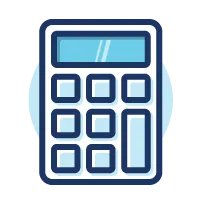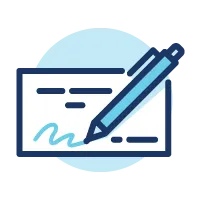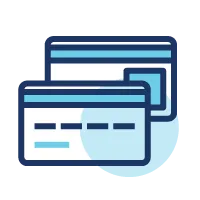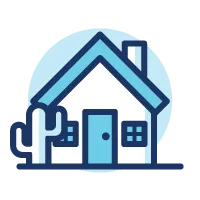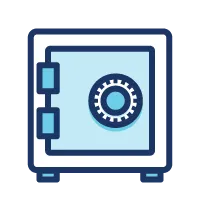Have you ever encountered an unfamiliar term related to your credit card, mortgage, or other financial information? You’re not alone! This A-to-Z glossary is a great start to understanding financial terminology.
Please note, these descriptions are a guide and are not legal definitions.
A
Adjustable-Rate Mortgage
An adjustable-rate mortgage, or ARM, has a rate that is fixed for an initial term, then is reassessed and changed periodically based on the market. For instance, you might have a 5/1 ARM, meaning your rate will remain the same for a 5-year term, and then may change on an annual or semiannual basis for the remainder of your loan term.
Annual Percentage Rate
The Annual Percentage Rate (APR) is the yearly cost of borrowing money. APR includes the interest and fees charged over a one-year period. Many types of debt include an APR such as credit cards, auto loans, mortgages and personal loans. The APR helps borrowers choose credit card offers, mortgages, loans, etc.
B
Balance
When referring to debt, like a credit card or loan, a balance is the amount of money remaining to be repaid. When the term “balance” refers to a checking or savings bank account, the balance is the amount of money present in the account.
Balance Transfer
A balance transfer refers to moving a balance from one account to another account, which is often an account at another financial institution. It most commonly describes transferring outstanding debt owed on a credit card to an account held at another credit card company.
Balloon Payment
A balloon payment is the money owed on a loan when the loan term expires (usually after 5-7 years). When the term is over, the borrower must make a payment for the total amount remaining on the loan, or the borrower can choose to refinance the loan for new terms and rates. Balloon loans sometimes allow the borrower to transfer the remaining amount automatically into a long-term mortgage.
Bankruptcy
When an individual or a company has debt that cannot be repaid, declaring bankruptcy gives the individual or company legal protection from the debts. Bankruptcy is a legal process that can offer relief from some or all debts, depending on the type of bankruptcy.
Budget
A budget is a written plan that tracks monthly expenses and income. It is used to help manage finances, keep current with expenses and save money.
C
Card Holder
A card holder is the person who is issued a credit card, along with any authorized users. The primary card holder is responsible for credit card payments. Credit card holders are protected by federal lending laws that protect consumer rights.
Cash Advance
A cash advance is a loan issued from a creditor. The most common cash advances are issued by a credit card or through a loan taken in advance of a paycheck. These types of cash advance loans charge special interest rates and fees on the amount of the advance. A credit card cash advance is typically the costliest credit card transaction compared to purchases or balance transfers.
Cash Advance Fee
A cash advance fee is a charge the borrower must pay for taking a cash advance loan. This fee could be either a one-time, flat fee that is owed at the time of the transaction or a fee charged as an annual percentage of the amount of the cash advance.
Collateral
Collateral is an asset that a lender accepts as security for a loan. If a borrower defaults on their loan payments, the lender has the right to seize the collateral and sell it to recoup any losses. A common example of collateral on a loan is the vehicle financed with an auto loan.
Collections
Collections occur when a borrower is late on payments for a debt. The creditor or business may attempt to collect past-due debt or sell the debt to an agency that will attempt to recover the amount owed. The delinquent debt could be past due credit card payments, utility charges, medical bills, cell phone bills or other payments that are over 6 months past due. Collection agencies may attempt to recover past due debts by contacting the borrower via phone and mail.
Conventional Mortgage
A conventional mortgage or conventional loan is available through a private lender or two government-sponsored enterprises—Fannie Mae and Freddie Mac. Conventional loans are considered risky because they’re not guaranteed by the government. These mortgages can have strict requirements and higher interest rates and fees.
Credit
Credit refers to money that is borrowed that the borrower will need to repay, like an auto loan or credit card.
Credit Card Charge-Off
A credit card charge-off occurs when a borrower does not pay the full minimum payment on a debt for several months. At that time, the creditor writes it off as a bad debt. Note that a credit card charge-off doesn’t absolve a borrower of responsibility for the debt. Interest is still owed on the balance. Even after a credit card charge-off, the lender could turn over the account to a collection agency.
Credit History
A person’s credit history develops as they borrow, repay and manage their loan payments, expenses and other transactions. The history may include information on current or previous loans, including amount borrowed, length of the loan, type of loan, and any payments that may have been missed. Future loans depend on a solid credit history, because lenders check your credit report, which includes credit history.
Credit Report
A credit report is a statement that has information about a person’s credit history, including loan payment history and the status of credit accounts. Lenders use credit reports to help them decide if they will loan money and what interest rate they will charge.
Credit Score
A credit score is a number based on a formula using the information in a person’s credit report. The result is an estimate of how likely that person may be to pay bills or repay loans. Lenders use credit scores to determine what interest rate they will offer on credit cards, mortgages, auto loans and more. If you pay all your bills on time and keep your accounts open for several years, you’re likely to be considered a safe bet for lenders. On the other hand, if you miss several payments on other loans, lenders may not want to risk extending credit to you in case you decide not to repay them.
Creditor
A creditor is a person or institution that extends credit by lending a borrower money. The borrower agrees to repay the funds under agreed-upon terms.
D
Debt
Debt is money owed to a lender, such as debt from credit cards, an auto loan or a mortgage.
Debt Consolidation
Debt consolidation means that a person’s debts, whether credit card bills or loan payments, are rolled into a new loan with one monthly payment. A debt consolidation loan does not erase debt.
Debt Management Plan
A debt management plan is when an organization works with creditors to reduce a borrower’s monthly payment and interest rates. People working through a debt management plan typically take three to five years to pay off debt. For those who team with a national nonprofit like GreenPath, a debt management plan is delivered by financial counselors certified by the National Foundation for Credit Counseling (NFCC) who receive training in compassion and empathy.
Debt Counseling
Borrowers receive debt counseling (also called credit counseling) when a trained credit counselor reviews their finances, debt and credit history to make personalized recommendations to help manage financial challenges. In the case of GreenPath, debt counseling is provided by certified financial counselors who take into consideration a person’s total financial picture, from outstanding credit card payments to overall financial health.
Debt Settlement
Debt settlement is a process of negotiating with creditors to accept a percentage of the full amount on debt that is charged off or severely delinquent. For-profit debt settlement companies operate to deliver profits to their organization. As part of the for-profit business model, debt settlement employees are often paid on a commission basis, based on the fees they collect from consumers.
Default
A default on a loan occurs when a loan payment is not made by the borrower according to the payment terms of an agreement.
Deferment
A loan deferment is when a lender agrees that a borrower can pause making monthly loan payments for a set amount of time. Loans that are deferred are not forgiven. The borrower still owes the money and must repay the debt.
Delinquent
When a borrower is late or overdue on making a payment, such as payments to credit cards, a mortgage, an auto loan or other debt, they are considered delinquent on the loan. A delinquent borrower may be charged a late fee for each missed payment.
F
Fair Debt Collection Practices Act
The Fair Debt Collection Practices Act is a set of laws that protect consumer rights during the debt collection process.
Fannie Mae
Fannie Mae, the informal name of the Federal National Mortgage Association, is a U.S. government-sponsored enterprise that buys mortgages from lenders, bundles them into investments and sells them on the secondary mortgage market. Typically, Fannie Mae purchases home mortgage loans from big banks or commercial lenders.
Finance Charge
A finance charge is the cost of borrowing money. The cost to a borrower includes interest and other fees. Lenders typically set finance charges as a percentage of the amount borrowed. Some lenders might set a flat-fee finance charge.
Fixed Rate
A fixed rate is an interest rate that stays the same for the life of a loan, or for a portion of the loan term, depending on the loan agreement. With a fixed-rate mortgage, your rate is set, or fixed, for the entire term of your loan, which is commonly 15 or 30 years. A fixed rate means your monthly payment will stay the same for the life of your loan—no surprises!
Forbearance
Forbearance is a process when a lender agrees to a lower payment or no payment for a temporary period. Forbearance is not loan forgiveness. After that time expires, the borrower may face higher payments, accrued interest or an extended loan term.
Foreclosure
Foreclosure is a legal proceeding that happens when a borrower does not make payments on a secured debt. The lender may start legal foreclosure proceedings to seize the property associated with the debt. As an example, default on a mortgage could result in foreclosure and auction of the property.
Freddie Mac
Freddie Mac, the informal name of the Federal Home Loan Mortgage Corporation, is a U.S. government-sponsored enterprise that buys mortgages, combines them with other forms of loans and sells the debt on the secondary mortgage market. Typically, Freddie Mac purchases home mortgage loans from smaller banks or lenders.
G
Grace Period
A grace period is a set period in which borrowers do not have to pay finance charges or interest if they pay balances in full. Revolving credit card lending provides a borrower with a grace period. For instance, if you pay your credit card balance in full every month, you will not be charged interest on the balance.
I
Interest
Interest refers to the cost of borrowing funds, paid to the lender by the borrower. Interest also means the profit that accrues to those who deposit funds in a savings account or investment.
Interest Rate
An interest rate is the fee lenders charge a borrower, calculated as a percentage of the loan amount. The percentage charged when borrowing money is known as the interest rate.
L
Loan Forgiveness
Loan forgiveness means a borrower is no longer obligated to make loan payments. With student debt loan forgiveness, the borrower must meet certain criteria such as actively serving in the military, performing volunteer work, teaching or practicing medicine in certain types of communities, or must meet other criteria specified by the forgiveness program.
Loss Mitigation
Loss mitigation is the process when mortgage servicers work with borrowers to avoid foreclosure.
Loan Modification
Loan modification is when a lender makes a permanent change to loan terms. The modifications could include changing the interest rate, type of loan or extending the time to pay the loan balance.
M
Minimum Payment
The minimum payment is a payment made on a loan or credit card that is specified by the lender as the smallest payment amount due. Borrowers can pay more than the minimum payment.
Mortgage
A mortgage is the loan a borrower takes on from a lender to purchase real estate.
P
Past Due
Past due is when a payment has not been made by its due date. Borrowers who are past due will usually face penalties and are subject to late fees.
Private Mortgage Insurance
Private mortgage insurance is a type of mortgage insurance that might be required for borrowers with a conventional home loan. Private mortgage insurance protects the lender in the event a borrower stops making payments on the loan.
R
Reinstatement
Reinstatement refers to a lump sum payment that makes a previously past-due loan account current when the borrower pays everything that is owed. This payment would include any missed payments and fees.
Repayment Plan
A repayment plan is a written agreement for borrowers who are past due on loan payments. This option allows the borrower to pay the late amount as a smaller addition to the regular monthly payment, spread out over several months.
Revolving Credit
Revolving credit is credit that can be used, paid down, and reused up to a predetermined credit limit. When the balance is paid down, that money is once again available for use. Revolving credit may take the form of credit cards or lines of credit with other lenders.
S
Secured Debt
A secured debt is a loan that allows the lender to seize the asset or collateral used to acquire the debt to repay the loan in the event of default. Examples of secured debt are mortgages and auto loans. In these cases, the item being financed—the house or vehicle—is used as collateral.
Short Sale
A short sale is when a homeowner in financial distress sells property for less than the amount due on the mortgage.
U
Unsecured Debt/Unsecured Loan
Unsecured debt or an unsecured loan is a loan that is not backed by an asset or collateral. It is considered riskier than secured debt. The interest rate for unsecured debt is normally higher than for secured debt.
APR = Annual Percentage Rate

